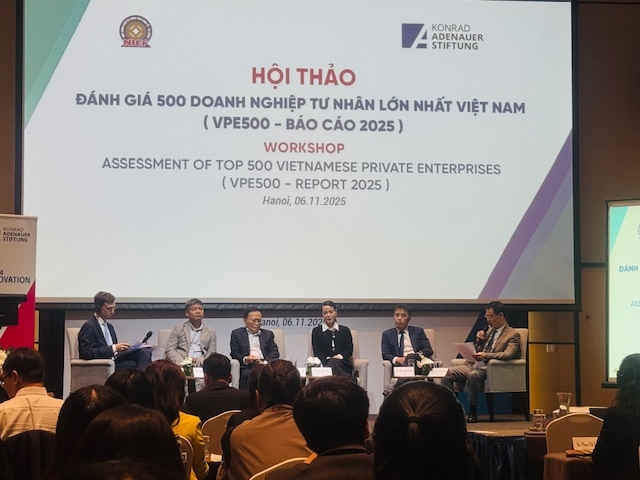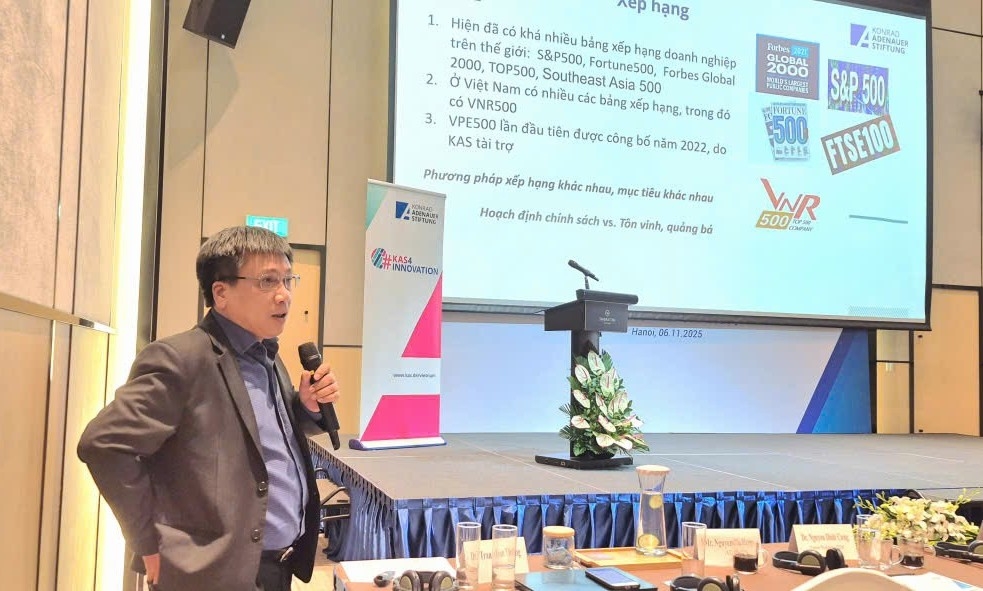Top private firms emerge as key drivers in Vietnam’s new growth phase
VOV.VN - Vietnam’s top largest private enterprises are the backbone of the economy and a key driver of Vietnam’s transition into a new era of growth and innovation while institutional reforms are expected to create a solid foundation for future development.

The remarks were shared by experts at a workshop held in Hanoi on November 6 to launch the report titled “Assessment of Top 500 Vietnamese Private Enterprises” (VPE500 - Report 2025).
The report examines the top private firms in Vietnam (VPE500), conducted by the National Institute for Economic and Finance (NIEF) with support from Konrad-Adenauer-Stiftung Vietnam.
Addressing the event, Lewe Paul, Resident Representative of Konrad-Adenauer-Stiftung Vietnam (KAS), emphasized that despite comprising just 500 companies, only 0.05% of the total 1 million enterprises as of 2023, the VPE500 plays a pivotal role in both the broader enterprise landscape and the private sector specifically. Since 2020, its impact has steadily grown across key areas such as revenue generation, capital investment, and employment.

“This year’s report, VPE500-2025, is especially timely. It not only continues the mission of providing annual insights into the features and performance of Vietnam’s top private firms, but also serves as a baseline for evaluating progress in the upcoming 2026–2030 period,” he added.
“The study aligns closely with the Politburo’s Resolution No. 68, which emphasizes the development of the private economic sector as a driving force in Vietnam’s industrialization, modernization, and global integration. We believe this research offers practical insights for policy enforcement and business environment improvement,” he noted.
Trinh Thi Huong, Deputy Director of the Agency for Private Enterprise and Collective Economy Development, highlighted the need to refine the legal framework to better assist private firms, referencing key policies including Resolution No. 68 and Resolution No. 198, which outline special mechanisms and policies aimed at supporting private-sector growth.
She noted that the amended Law on Investment is expected to deliver substantial improvements by streamlining procedures, thereby reducing time and costs from registration to licensing. The revised law also aims to enhance transparency through clearer regulatory guidelines that lower risks and reinforce investor confidence. Additionally, it promotes innovation by supporting emerging industries, high-tech fields, and new business models to attract high-quality investment.
Dr. Tran Toan Thang, Head of the International Studies and Integration Policies Division at NIEF, observed that within the private sector, VPE500 firms account for roughly 10% of employment, 22% of revenue, and 34% of capital, a rising trend.

This indicates a high degree of market concentration, along with robust investment momentum, demonstrating large enterprises’ expectations for future growth as well as their stronger resilience compared to smaller firms. By industry, VPE500 revenue shares stand at 50% in banking, 47% in real estate, and 13% in manufacturing.
He added that VPE500 firms demonstrate markedly higher levels of R&D and innovation activity than other domestic enterprises and even exceed FDI firms in some areas, underscoring their leading role in technological upgrading.
At the workshop, experts also put forward several policy recommendations focused on industrial development, particularly nurturing dynamic small and medium-sized enterprises in the technology sector into large corporations. Support is proposed through technology transfer initiatives and R&D funding.
To advance these objectives, pilot programs are set to encourage the formation of large business groups, accompanied by incentives to expand resource access and facilitate entry into global markets. The priority is to strengthen existing enterprises rather than create new ones. Major exporters are to receive support, along with companies transitioning toward export-orientated industrial production. Industrialization efforts will be accelerated through the development of heavy industries, with major corporations guiding strategic directions. Further assistance includes access to capital and market information.
Corporations will continue to work closely with the government in shaping industrial strategies. Support will also be provided for market entry into the electronics sector, along with improved access to foreign currency credit from international organizations.




